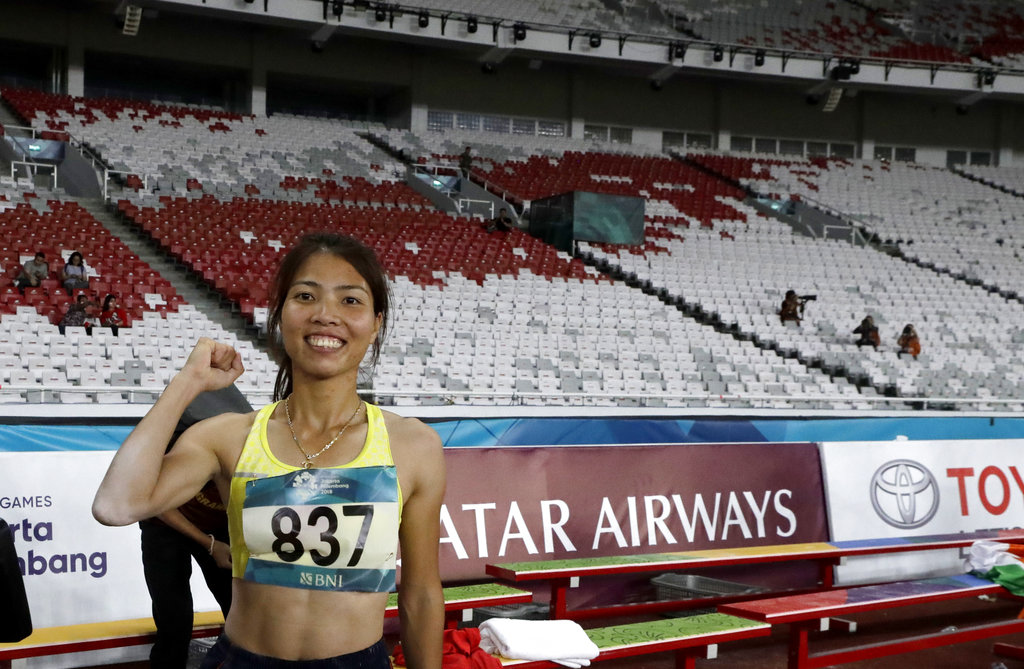Asian Games: Finding a seat no problem at track and field

In this Monday Aug. 27, 2018 photo, Vietnam’s Thi Thu Thao Bui celebrates after winning the women’s long jump final during the athletics competition at the 18th Asian Games in Jakarta, Indonesia. Crowds have been sparse at some Asian Games venues, particularly track and field where about 5,000 have been packed into a cordoned off section of the 76,000-seat national stadium. (AP Photo/Lee Jin-man)
JAKARTA, Indonesia — Some Asian Games crowds have been sparse, particularly at track and field where fewer than 5,000 fans at evening finals have been packed into a cordoned off section along the main straightaway at the 76,000-seat national stadium.
Organizers have closed off about half of the Gelora Bung Karno national stadium, hoping to pump up the atmosphere, which has been vibrant among those attending — particularly when Indonesian teenager and world junior champion Lalu Muhammad Zohri reached the final of the men’s 100. Just not enough attend.
Article continues after this advertisement“In Indonesia, people are not so familiar with athletics,” Ahmed Solihin, head of Asian Games support, told the Associated Press.
He listed badminton, volleyball and soccer as sold-old venues.
“They are always full, even if Indonesia is not competing,” he said.
Article continues after this advertisementSolihin said in Indonesia — a country of 260 million — “people are not aware of the sport,” which is the center-piece event for the Summer Olympics.
Solihin said top Olympic Council of Asia officials, the body that oversees the Asian Games, had suggested not showing empty seats in television broadcasts at the track and field venue.
He said officials “gave a hint to us to make the camera positions in a different way.” He said the OCA realized beforehand “it will be like that because athletics is not so familiar to the people.”
Through Wednesday, Indonesia had won a national-record 88 medals overall, in fourth place behind China, Japan and South Korea. But only two were in athletics, and neither was gold.
All of Indonesia’s seven gold medals in the Olympics have come in badminton. The country has not won a single medal of any kind in track and field.
The Asian Games, featuring more than 11,000 athletes in 40 sports, close their two-week run on Sunday. Most events have run smoothly even though organizers had less than four years to prepare after Vietnam, for financial reasons, withdrew from being the host nation.
Solihin said poor attendance at some events could also be blamed on an Asian Games computer ticketing system that he acknowledged “does not work well.”
Organizers chose a second ticket provider in the early days of the games, but the switch hasn’t entirely resolved the problems.
“We are discussing every morning with regard to the ticketing system,” Solihin said. He described how an on-line site shows tickets being sold out.
“But at the court (venue) there is nobody there,” he said. “Or at the venue there is a very long line to buy tickets and after several tickets are sold, they say it’s sold out.”
Sohihim talked hesitantly about any plan to seek the Olympics with International Olympic Committee President Thomas Bach expected at the closing ceremony.
He listed transportation as the No. 1 obstacle. He said in the run-up to the games he was asked how Indonesia was assembling a games transportation system “in one of the very worst (traffic) areas in the world, which is Jakarta.”
Sohihim said technology and broadcasting were viewed as the top organizational problems before the games opened.
“But during the games, of course it’s the transportation,” he said.
___